Artificial intelligence (AI) has transformed countless parts of society worldwide. Computers now track the spread of illness, assist with emergency response systems, and report key data points to business owners.
AI also plays a vital role in the ecommerce landscape. From customers’ first touch with a brand to post-checkout feedback collection, AI streamlines operations and allows businesses to scale their online sales efforts. AI tools are so useful that the number of businesses adopting them has grown exponentially in the past four years.
If you are ready to enhance your ecommerce operations, learn about the multiple ways AI can help. Here are a few opportunities to implement these tools for a better, more optimized user experience.
Types of artificial intelligence used in ecommerce
Artificial intelligence uses machines that can make decisions and take action based on the information you give them. For example, a self-driving car can read the colors at a stop light and decide to move forward when it turns green. An AI chatbot can pick up on the word “return” and launch protocols to help customers return a product they no longer want.
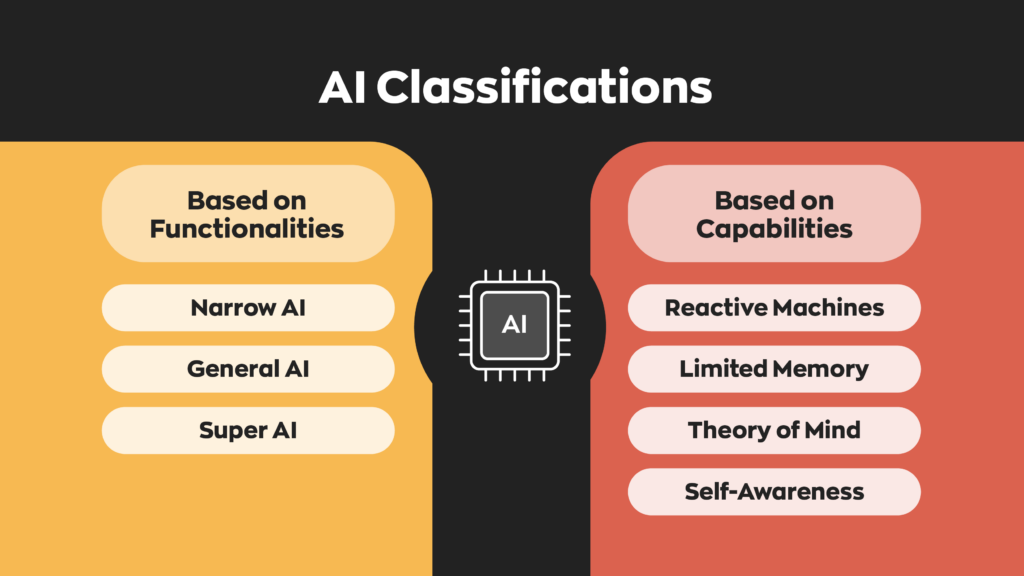
The market size for AI is expected to reach $184 billion in 2024. Multiple types of AI are useful in the world of ecommerce. Here are a few common concepts that you might encounter.
- Machine learning: If AI uses existing information to make decisions, machine learning takes new information, processes it, and bases future actions on those insights. Machine learning tools get smarter over time and save developers from having to program all possible information within an AI system.
- Natural language processing (NLP): This tool allows machines to analyze text to contextualize the meaning and tone of the information. Rather than picking up on keywords and replying with auto-responses, NLP allows for a more conversational back-and-forth between robots and humans.
- Predictive analytics: These tools allow computers to look at large bodies of data and organize them. Predictive analytics systems answer what happened while forecasting what will happen based on current trends.
You can already see how these tools might apply to your ecommerce operation, from the analytical insights you use to the conversations your chatbots have with potential customers. Here are a few ways you can use AI specifically within your business.
Personalized product recommendations
As soon as a customer lands on your ecommerce site, your goal is to get them to buy something. While you might show off your top products to new customers, AI tools can offer specific recommendations to returning customers or buyers as they browse.
For example, if a customer is looking at a pair of winter coats online, a recommendation tool, like the one created by Google, would highlight similar options that could also be a good fit. This is more effective than suggesting swimsuits when a buyer is looking for cold-weather gear.
Not only do recommendations create a positive user experience and grow your sales by increasing your conversions, but they can also help with warehouse inventory management. These tools can highlight low-inventory items or potentially recommend products that aren’t selling as they should.
Chatbots and virtual help desks
Chatbots need AI more than ever. Just 8 percent of customers say they used a chatbot during their last customer service interaction, and only 25 percent of those buyers said they would use a chatbot again in the future. This is often because chatbots are limited and clunky; however, natural language processing tools can change this. NLP makes conversations more dynamic and increases a bot’s ability to help customers.
As more ecommerce brands embrace NLP, more customers might be willing to get help from chatbots, especially if these bots can quickly solve their problems.
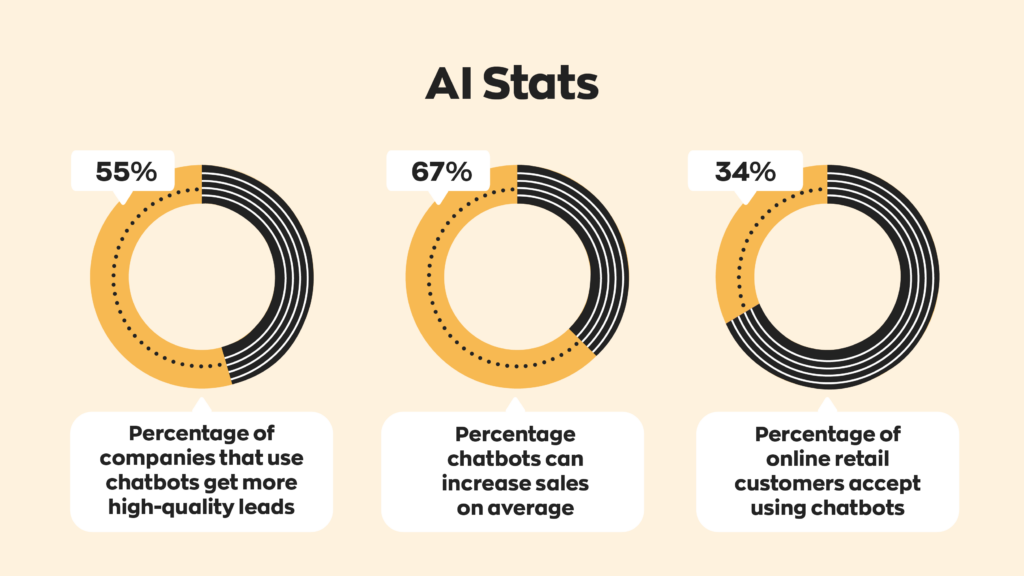
Inventory management
Good inventory management can alert companies when items run out of stock while highlighting products sitting stagnant on the shelves. AI tools track your inventory and send clear reports to your team. These tools can also use predictive analytics for their recommendations. For example, smart AI systems will tell an ecommerce brand to buy holiday items in November but wouldn’t recommend purchasing more Christmas ornaments in January.
AI for inventory tracking can also improve warehouse management. You can route specific products to certain areas and keep up with stocking and reordering to meet customer demand without overwhelming your staff.
Dynamic pricing optimization
There are multiple pricing strategies to adopt within your ecommerce business. Dynamic pricing uses AI to change the prices of goods based on market demand. You can see this most often in the airline industry. Prices for flights in the summer are usually higher because of customer demand for vacation travel.
You can use AI algorithms to adapt real-time pricing, which can help drive sales and keep inventory fresh. Your team can also use data-rich barcoding to set controls for specific price changes, so your tools only adjust the price points of certain items.
Generative AI copywriting
Copywriting can be an expensive and time-consuming part of ecommerce. To win over customers, you need to create unique and engaging product descriptions for every item. Fortunately, natural language processing is working to streamline this process. AI tools can generate accurate product descriptions that sound like they were written by a human.
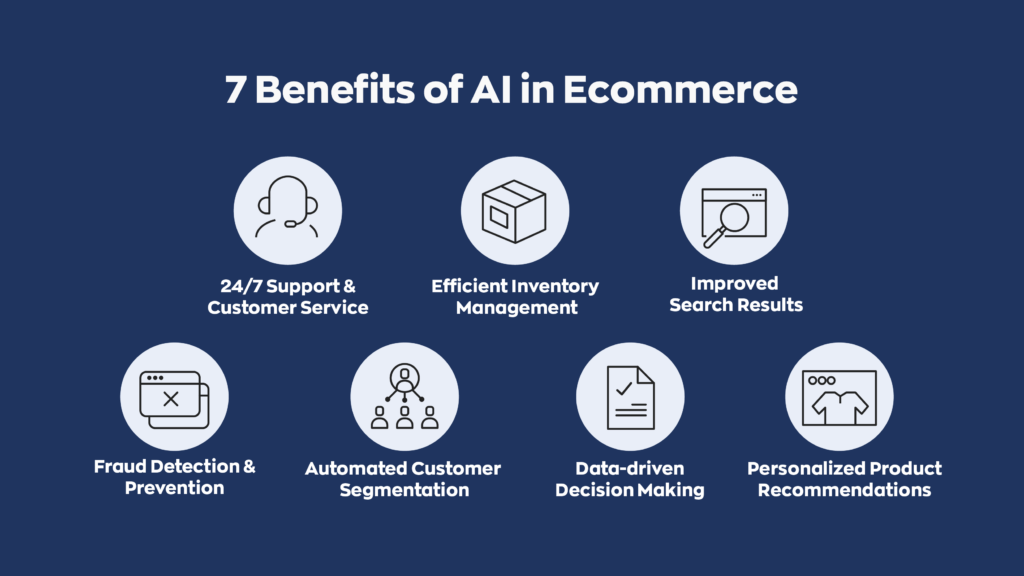
You can also use generative AI to create other marketing content like blog articles and social media posts.
Fraud detection and prevention
Scammers increasingly try to steal money and goods from companies through their ecommerce channels. In fact, ecommerce fraud is expected to exceed $48 billion in 2023. AI tools can track customer interactions and spot fraud before your company processes the sale.
Fraud tracking is also a great example of how companies use the power of machine learning. Scammers must constantly develop new tactics to steal from companies, which means AI tools need to discover these new patterns to stop them. Machine learning tools can often identify fraud patterns before humans do.
Customer engagement and retention
Many AI tools run in the background of your ecommerce business and work to retain and engage existing customers. For a few examples, these tools can keep items in customer carts and send email reminders when they abandon the checkout process. AI can segment customers based on user behavior and recommend products based on demographics like gender or size. These processes would otherwise be severely time-consuming for marketing teams.
The smarter predictive analytics grow, the better these engagement efforts become. AI tools can use more insights and data to create personalized and timely campaigns for customer retention.
More opportunities for optimizing with AI
While AI benefits your ecommerce operations, it can also help other parts of your business. Here are a few considerations to remember as you explore artificial intelligence tools.
- Manufacturing: Keep up with your various parts and assembly materials with manufacturing software. This allows you to keep producing new items while avoiding unexpected delays.
- Packaging automation: Streamline the packaging process with systems that choose the right boxes to save space while keeping your products safe.
- Supply chain logistics: Work with your suppliers and vendors to maintain a healthy supply chain. This pairs with your manufacturing and inventory management tools so you always have the necessary materials.
- Fleet management: Optimize routes to save gas while keeping your drivers safe. Track your fleet vehicles and ensure you always have a truck and driver ready for any necessary route.
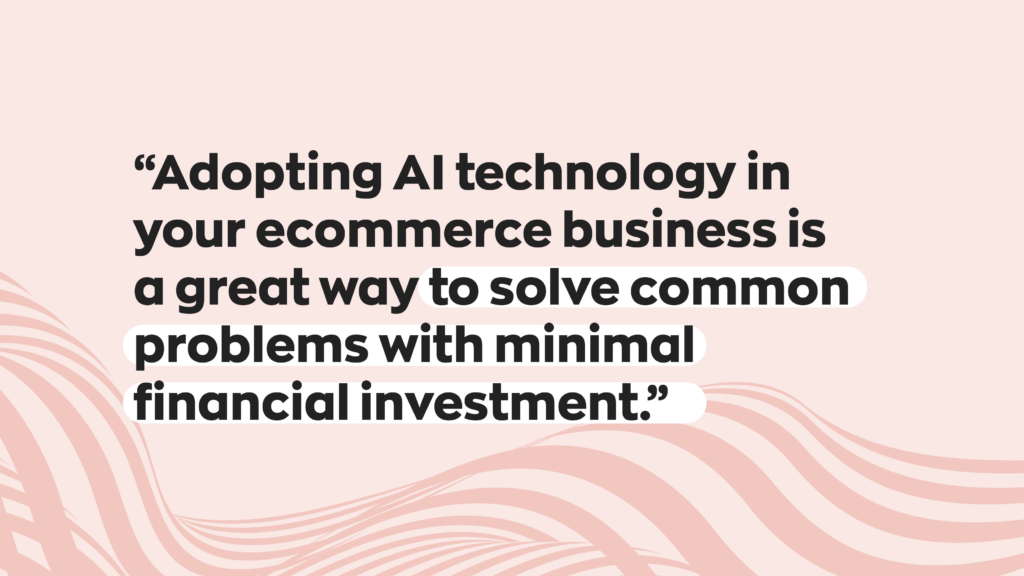
Almost any ecommerce business can utilize AI in some manner. Small companies can scale their marketing efforts while increasing customer retention, while large ecommerce enterprises can improve their pricing strategies while managing inventory across the country. AI is a powerful tool for reducing costs, increasing profits, and staying competitive in your field.
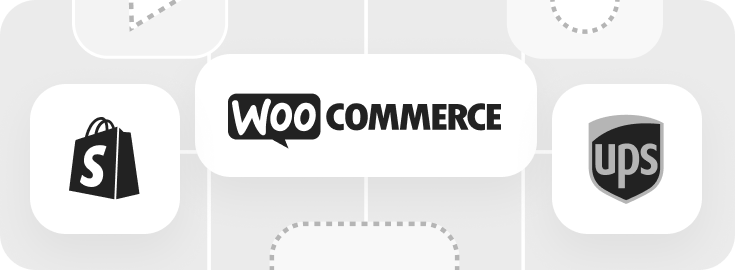





0 Comments